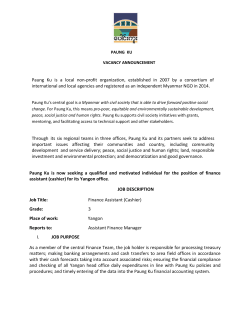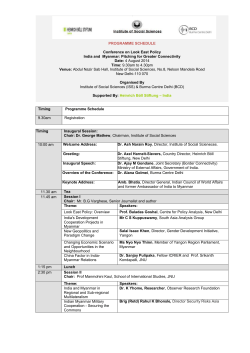
Terms of Reference- Consultant Save the Children Myanmar Background & Overview:
Terms of Reference- Consultant Save the Children Myanmar Background & Overview: This project is a pilot one year project implemented in two townships in Kayah (Karenni) State targeting conflict affected areas. The Kayah population in south east Myanmar has experienced decades of economic marginalization, political exclusion, violence and armed conflict. The conflict between the Karenni Army (KA), armed wing of the Karenni National Progressive Party (KNPP), and Government forces in Kayah state has led to large-scale internal displacement and movements of refugees into Thailand. It is widely recognized that communities have been isolated for decades and are extremely resilient and that organizations should take a cautious approach to programming that seriously considers and supports existing coping strategies and community approaches to development, rather than imposing standard approaches and large scale development. Strategically Save the Children in Myanmar is taking proactive efforts to adopt and implement a more systematic approach that ensures all programmes are conflict sensitive in order to achieve better and more sustainable results for children affected by conflict and to improve the quality and impact of programmes. Save the Children in Myanmar understands this as a first step approach to a much longer term goal of contributing to Peace-building across conflict affected areas. Save the Children would like to use its programming as a base and entry point as a way of finding meaningful ways in which children and families can contribute to and participate in the peace process. As part of this process Save the Children sees the strategic importance of local partners as they know and understand the communities that they work in. This programme looks at two distinct programming areas that include 7 villages of refugee returnees from Thailand (Shadaw) and 7 villages that are hosting IDP returnees (Bawlakhe). In order to protect children in Kayah and promote their development and well-being, the programme proactively addressed conflict drivers and strengthens conflict mitigators. During its first year, the Kayah project focused on trustbuilding and operated via a “soft”, technical approach. Save the Children used its expertise to put programmatic emphasis on the provision of basic literacy and numeracy as an entry point where government schooling was not available and could be used as a platform to start raising awareness on child protection, child rights and the importance of children’s voice. Due to the complexity of the context, the need to build acceptance for Save the Children in a new operational area, and the sensitive nature of the project’s long-term peacebuilding and youth governance objectives, ensuring comprehensive conflict sensitivity and Do No Harm approach to ensure that these programmatic themes were relevant and desired and further more dictated the way in which they should be delivered. Taken into account of quality and effectiveness, Save the Children implemented this project through two local based Kayah organizations which familiar with local context and geographic areas by strengthening their organizational and technical capacity. Objectives of the consultancy The consultant will be requested to undertake an end project evaluation. The evaluation will focus on assessing the overall impact of the programme as well as outcomes under each of the project objectives during the intervention. Particular attention will be paid to the impact of the project on conflict sensitive programming, the capacity of the two local partners’ staff and other key stakeholders, provision of Non Formal Education (NFE) for children, children’s capacity and participation in local level peace initiative, and effectiveness of child rights monitoring and advocacy in the two townships of Kayah State. In addition to assessing project impact, the evaluation will assess the effectiveness and efficiency of project delivery including: project management and project monitoring review. The objectives of the evaluation are as follows: • • Assess the output and outcomes of the project focusing on the objectives Assess overall impact of the programme and identify and explain what changed for whom and why (causal analysis: enablers and constraints and how these affect the project implementation). • Assess the degree to which the project achieved the objectives and results described in the project design documents (proposal and logframe) • Assess the effectiveness and efficiency of project management and delivery The evaluation will also explore the sustainability of the project results and outcomes with a focus on institutional sustainability. Methodology: Both quantitative and qualitative methods will be required to collect data from different project stakeholders, including community beneficiaries, children, two local based partners’ staff, TCRC members, children groups, and other stakeholders. The consultants will be expected to use a variety of data collection techniques including: structured questionnaires, key informant interviews and FGDs. The consultants will also ensure that children participate in the evaluation process and that their views and opinions are given equal weight during data analysis and the preparation of the evaluation report. Save the Children teams will support field work including logistics and data collection as required. Specific Tasks and Responsibilities: a) Review project documentation (proposals and training report, narrative reports, M&E data and financial reports) b) Meet with key Save the Children Staff and partners to gain an understanding of the project c) With support from the CRG team, develop an evaluation plan including primary data collection (qualitative and quantitative) d) Conduct field research/primary data collection e) Analysis of data and drafting evaluation report f) Presentation of findings to Save the Children teams (PDQ & PI, CRG team) g) Finalization of evaluation report Team structure: The evaluation team will include a lead and a support consultant. The lead consultant will have demonstrated international experience of conducting project evaluations for complex, multi sectoral projects including civil society strengthening, Child Rights, Governance, and conflict sensitive programming preferably in SE Asia. The lead consultant will also have a sound understanding of Save the Children expectations and requirements as well as nature of Child Rights Governance. The lead consultant will be responsible for ensuring that the evaluation deliverables are met. The support consultant will be a fluent speaker of Burmese and English with previous experience of conducting evaluations for community based programmes in Myanmar. Ideally, the support consultant will have education, civil society or child focused programming experience, including work with Child Rights and Child Protection Programmes. Timetable: The evaluation will be conducted in December 2014. Activity Review project documentation, start to develop evaluation plan Travel to Yangon (depends on the consultant’s based country) Location Days Evaluation Week # Yangon 2 1 ?? -Yangon 1 1 Meet with key Save the Children staff to gain an understanding of project Yangon 1 1 With support from CRG team, develop a detailed evaluation plan including data collection instruments and list of informants, and arrange logistics for field visits Yangon 1 1 Conduct field research/primary data collection (visit to the project areas depends on the approval of the State authorities Yangon – Loikaw (Bawlakhe/Shadaw) 5 1&2 Analysis of data and drafting report Yangon 3 2 Presentation and discussion of findings and preliminary conclusions Yangon 1 2 Yangon- ?? 1 3 Home 3 3 Travel to home base (depends on the consultant’s based country) Finalization of evaluation report Total 18 Total number of days = 18 Written Deliverables: a) Inception report: • Preliminary findings of the desk study of existing material and literature related to the project. • Issues on the evaluations questions including preliminary hypothesis. • Data collection instruments and proposed methodology. • Sampling strategy • Limitations of the evaluation b) Draft evaluation report including: • Executive summary • Description of the methodology adopted during the evaluation • Presentation of key project data and a detailed analysis of the evaluation findings • Presentation of key project management data and a detailed analysis of the evaluation findings • Summary of Strengths and weaknesses of the programme design and management /implementation modalities • Conclusions and recommendations including: specific actions that might be taken into consideration in designing future projects on demonstrating a sustainability community based model that can be taken to greater scale • Two detailed case studies c) Final Evaluation report (maximum 40 pages excluding Annex) • Based on comments and inputs from SCI Myannmar present a revised evaluation report. • Powerpoint presentation with key findings, conclusions and recommendations. d) 2 page evaluation overview, highlighting key successes, challenges and impacts of the project Terms of Payment: The consultant will be paid 450 USD (including meal cost) per day for working in Yangon Region as well as field trip to Kayah State (?? Total working days). Payment will be made in three installments upon delivery of the deliverables and submission of invoice respectively. The first delivery will be the inception report and 20% payment will be made upon completion and submission of the 1st deliverable. The second deliverable will be the draft evaluation report and 30% of payment will be made. And the third deliverables will be the final evaluation plus the 2 pages summary. Upon completion and sign off of the final evaluation report, 50% of payment will be made as final payment. The consultant’s international and local travel cost related to project evaluation, and accommodation in Yangon and project areas will be provided by Save the Children International Myanmar Country Office. Interested and qualified candidates are requested to send an Application Letter, Curriculum Vitae to: Human Resources Department| Save the Children| Wizaya Plaza-First Floor| 226 U Wisara Road| Bahan Township| Yangon| Myanmar Email address: recruitment.myanmar@savethechildren.org not later than 5 P.M., 24 November 2014 (Monday). Note: The job vacancy can also be viewed in SCI web site http://myanmar.savethechildren.net/jobs. Candidates are also requested to mention in the applications if there is, blood/marriage relationships with the existing Save the Children employees. No requirement of photo or copy of certificates and only short-listed candidates will be contacted. Remark: For those who failed to mention or incorrectly mention the apply position title, Programme/Sector name and location in their applications, we will consider those as disqualify and we will not consider for short list.
© Copyright 2025





















